If you’re looking for an easy way to keep your vegetable garden healthy and thriving, look no further than Preen! This weed preventer is a great choice for organic gardens, and it can help improve the overall health of your plants. In this guide, we’ll answer some common questions about how to use Preen in your vegetable garden, as well as provide some helpful tips on getting the most out of this product. Let’s get started!
What is a Preen?
Preen is a brand of a weed preventer that is commonly used to control weeds in gardens and landscapes. The active ingredient in Preen is trifluralin, which is a herbicide that prevents weed seeds from germinating.
There is a Natural Preen option as well, the main ingredient there is corn gluten, which is a natural substance that still prevents weed growth just as well. It is safe to use around children and pets, and it will not harm your vegetables or other plants.
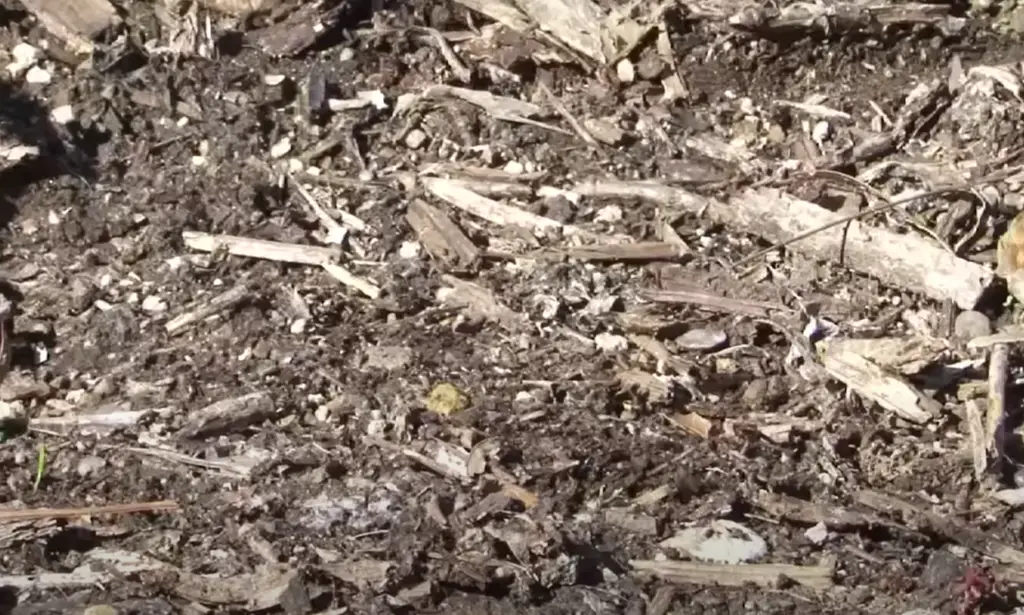
Preen works by coating the ground with a thin layer of herbicide. When weed seeds germinate, they send out roots that come into contact with the herbicide and are killed.
Preen comes in granular form. When applied with a broadcast spreader, the product can be easily and evenly coated over large areas to protect your lawn from. [1],[2],[7]
Uses of a Preen Weed Preventer
Being a pre-emergent herbicide, Preen is used to prevent weed seeds from germinating. You can use it around the perimeter of your house to prevent weeds from invading your flower beds, or in vegetable gardens to keep weeds from competing with your crops for nutrients.
The best time to apply Preen is in early spring, before weeds start to germinate. For most areas of the country, this means late February or early March.Differences Between Weed Preventer and Weed Killer
Preen is a weed preventer, not a weed killer. That means it prevents weeds from germinating and growing, rather than killing existing weeds. This is an important distinction to make because it changes the way you use Preen in your garden.
With a weedkiller, you would wait until you see weeds sprouting up and then apply the product to kill them. With Preen, you need to apply it before the weeds have a chance to germinate.
Preen also comes in different formulations for different uses. There is a general-purpose formulation that can be used around ornamentals, trees, and shrubs.
Weed killers, on the other hand, come in two types: selective and non-selective. Selective weed killers only kill certain types of weeds, while non-selective weed killers will kill any type of plant they come into contact with. They also leave unsightly dead plants in their wake.
Because weed killers are more aggressive, you will need to be more careful when using them around your garden. Even selective herbicides can harm your vegetables if you will use them in large quantities. [3], [4]
Is Preen Safe to Use in Vegetable Gardens?
Yes, Preen is safe to use in vegetable gardens when used as directed. The trifluralin used in Preen, only stops the germination of weed seeds. It will not harm existing vegetables, flowers, trees, or shrubs.
Preen can be applied around your vegetable garden as a precaution from weed invasion, or directly over the planting area before you sow seeds or transplant seedlings. Be sure to follow the product label instructions for best results.
While preen products are safe to use around established plants, they should not be used on newly seeded or sodded areas until after the seedlings have emerged.
Now that we know what Preen is and how to use it, let’s take a look at some tips for using Preen in your vegetable garden. [1],[5],[6],[7]
How to Use Preen in Your Garden
Wear protective clothing
Preen is a herbicide and, as such, you should take care to avoid contact with your skin and clothes. Wear long pants, a long-sleeved shirt, gloves, and goggles when handling Preen products. If you do get Preen on your skin, wash the area immediately with soap and water. If you get it in your eyes, flush them out with water for 15 minutes.
Uproot all the weeds
Preen is most commonly used as a pre-emergent herbicide. This means that it is applied to the soil before weeds start growing. When used this way, Preen will prevent weed seeds from germinating. It will not kill existing weeds. For that reason, it’s important to remove all the weeds from your garden before you apply Preen.
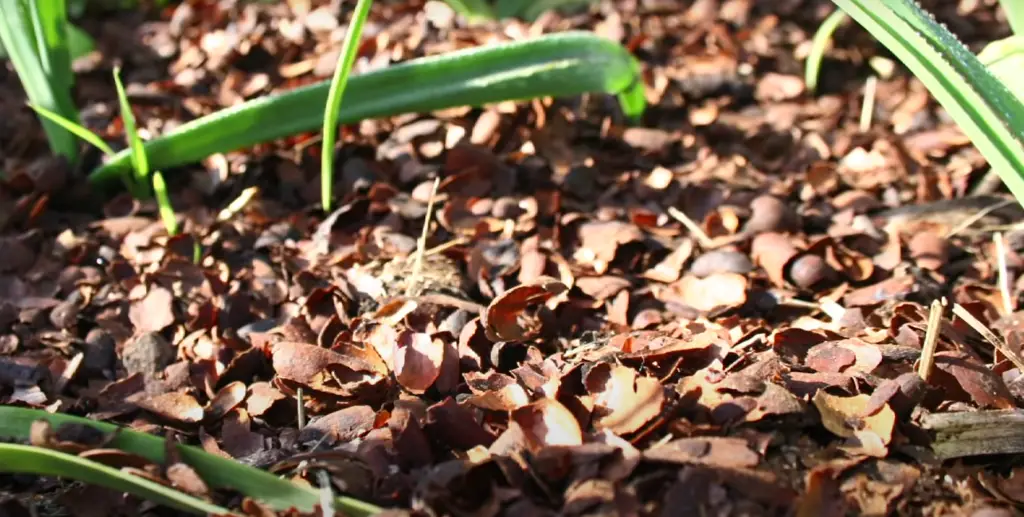
To get rid of existing weeds, you can either pull them by hand or use a chemical herbicide. If you choose to use a chemical herbicide, make sure it is safe for the vegetables you are growing. You don’t want to accidently poison your food!
Once all the weeds are gone, you can move on to applying Preen.
Rake the soil
The next step is to rake the soil. This will help to loosen it up and make it easier for the Preen to penetrate. If you’re applying Preen to a large area, you may want to consider renting a power rake. This will save you a lot of time and energy.
Spread the granules
Now it’s time to apply the Preen. You can do this by simply shaking the bottle or using a munchkin. If you have a lot of ground to cover, you may want to use a fertilizer spreader. Whichever method you choose, be sure to evenly distribute the Preen granules over the entire garden. You don’t want to miss any spots or apply too much in one area.
You can use rake again to help spread the granules around and integrate in soil better, or you can just let them sit on top of the soil.
Sprinkle them with water
Once you’ve applied the Preen, it’s important to water it in. This will help to activate the herbicide and ensure that it works properly. A light sprinkling should be enough. You don’t want to wash away all of your hard work!
Wait before planting your vegetables
Now that you’ve applied Preen, you need to wait some time before planting your vegetables. This will give the herbicide time to work and prevent any seedlings from being killed.
Once the waiting period is over, you can go ahead and plant your vegetables. Be sure to follow the instructions on the seed packet or transplanting guide.
What to Keep in Mind When Using Preen
Preen is a great tool for keeping your vegetable garden free of weeds, but it’s important to use it correctly. Here are a few things you need to keep in mind when using it.
Don’t apply preen on seeds or young saplings
Preen works by stopping weed seeds from germinating. This means that if you apply it to your garden before planting, it will prevent your seeds from germinating as well. For this reason, you should only apply Preen after you’ve planted your seeds or saplings.
If you have young plants that are already growing in your garden, don’t worry – Preen won’t harm them. It’s only harmful to seeds that haven’t sprouted yet.
Don’t disturb the soil after application
Once you’ve applied Preen, it’s important to leave the soil undisturbed. This means no tilling, hoeing, or raking. You also shouldn’t plant anything else in the area for at least a week.
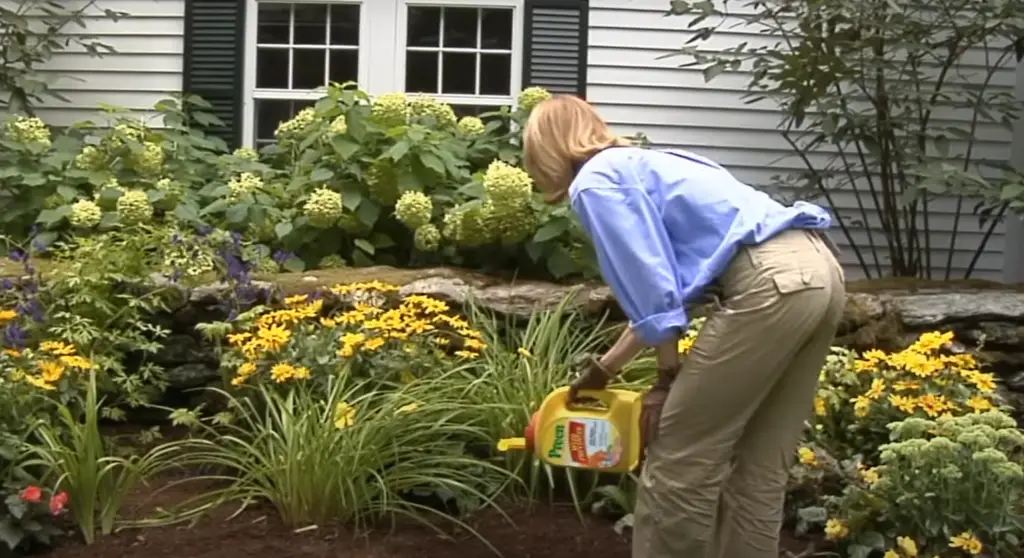
If you disturb the soil after applying Preen, you run the risk of removing the herbicide from the top layer of soil where it needs to be. This can reduce its effectiveness and allow weed seeds to germinate.
Don’t use Preen on the flower soil
Preen is also harmful to flower seeds. If you want to use Preen in your garden, make sure to keep it away from the area where you’re growing flowers.
It won’t work on lawns
Preen is only effective on gardens – it won’t work on lawns. If you have a weed problem in your lawn, you’ll need to use a different product.
Lawns are made up of grasses, which have very different root systems from the weeds that grow in gardens. The roots of grasses are much deeper underground, so Preen can’t reach them.
As you might have realized by now, if you’re using Preen to try and kill existing weeds, you’re out of luck. Preen only works as a preventative measure. It simply prevents weed seeds from germinating and growing in the first place.
This means that it should be applied to the soil before weed seeds have a chance to germinate. If you wait until after the weeds have already started growing, Preen will not be as effective.
Make sure to uproot them completely, including the root system, or they’ll just grow back. You can also use a hoe to loosen up the soil around the weed so that you can pull it up more easily.It may not deal with all weed types
Preen is effective against most common garden weeds, but there are always exceptions. If you’re having trouble with a particular type of weed, it’s possible that Preen just won’t work on it.
Some types of weeds are resistant to herbicides, which means that even if you use Preen, they may still continue to grow in your garden.
It isn’t a permanent solution
Another thing to keep in mind is that Preen won’t work miracles. It will help reduce the amount of weeding you have to do, but it won’t completely eliminate weeds from your garden.
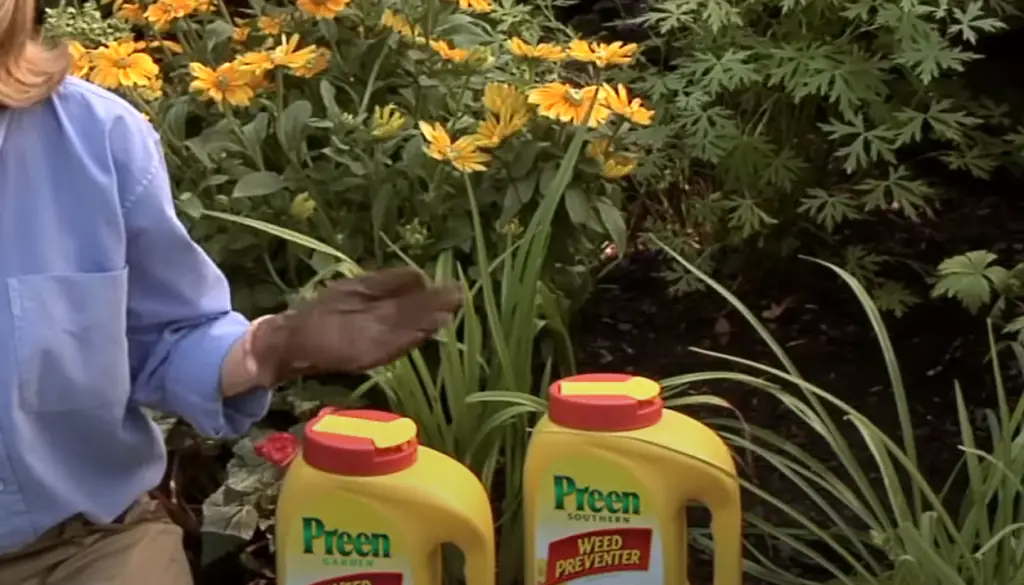
Preen also won’t last forever. It only lasts for about one-three months, depending on the Preen type, so you’ll need to reapply it every few months to keep your garden weed-free. [5],[6],[7]
Comparison of the Effectiveness of Preen in Vegetable Garden
Preen is a popular pre-emergent herbicide used by gardeners to prevent weed growth in vegetable gardens. However, there are various factors to consider when using Preen. In this table, we will compare the effectiveness of Preen in vegetable gardens based on different indicators.
| Indicator | Preen Effectiveness |
|---|---|
| Length of Weed Control | Up to 12 weeks |
| Types of Weeds Controlled | Most annual grasses and broadleaf weeds |
| Compatibility with Vegetables | Safe to use around most vegetable plants |
| Application Method | Spread granules evenly over the soil surface |
| Effect on Soil pH | No significant effect |
The table compares the effectiveness of Preen in vegetable gardens based on different indicators. The length of weed control is up to 12 weeks, which means that Preen can provide long-lasting weed prevention. It can control most annual grasses and broadleaf weeds, making it a versatile herbicide option. Preen is also safe to use around most vegetable plants, ensuring that your vegetables are not affected. The application method is simple, as it involves spreading granules evenly over the soil surface. Additionally, Preen does not have a significant effect on soil pH, which is important for maintaining soil health.
FAQ
Can you use Preen around vegetables?
Yes, Preen can be used around vegetables. In fact, it is often recommended for use in vegetable gardens. Preen works by preventing weed seeds from germinating, so it can help to keep your vegetable garden free of weeds.
It is important to read the label carefully and follow the directions when using Preen, as it can also prevent some vegetables from germinating if used incorrectly. Some people also like to use mulch in their vegetable garden in addition to Preen. Mulch can help to suppress weeds and retain moisture in the soil.
Can you put Preen around tomato plants?
Yes, Preen can be used around tomato plants. However, it is important to note that Preen will not prevent blossom end rot, which is a common problem with tomatoes.
Preen can also be used around other types of vegetables, such as peppers and eggplants. It can help to keep these plants free of weeds and pests. While Preen is safe to use around most vegetables, you should always read the product label before using it in your garden.
How do I keep weeds out of my vegetable garden?
The best way to keep weeds out of your vegetable garden is to use a product called Preen. Preen is a pre-emergent herbicide that prevents weed seeds from germinating. It is safe to use around vegetables and will not harm them if used as directed.
Since Preen won’t deal with fully grown weeds, you’ll need to resort to another method. A great option would be a specialized weed killer that is safe to use around vegetables.
Can you use Preen and fertilizer at the same time?
Yes, you can use Preen and fertilizer together. However, you should always read the labels on both products to determine the best application method and timing for your particular vegetable garden.
Preen is a pre-emergent herbicide, which means it prevents weeds from germinating. Fertilizer provides nutrients that help plants grow. Therefore, it is important to apply Preen before weeds have a chance to sprout and compete with your vegetables for space and resources. It is also important to follow the directions on the fertilizer label so that you do not over-fertilize and damage your plants.
How long does Preen last?
Preen only provides weed control for up to three months. After that, you’ll need to reapply it or pull the weeds by hand. If you have a heavy weed problem, you may need to reapply Preen more often.
If you plan on using Organic Preen, keep in mind that it will last for only one month, which is much less than Treflan Preen does.
When is the best time to use Preen in vegetable gardens?
The best time to use Preen in vegetable gardens is before planting. By applying a layer of Preen, you can help prevent weeds from germinating and growing in your garden. You can start using Preen in the spring as soon as perennial plants begin to grow and soil temperatures warm up.
Preen can also be applied after planting, but it may not be as effective at preventing weeds from growing. If you have already had problems with weeds in your garden, you may want to consider using a different method of weed control.
What are some of the benefits of using Preen in a vegetable garden?
Preen is an effective weed preventer that can be used in a vegetable garden. Some of the benefits of using Preen include:
- It prevents weeds from germinating and growing
- It keeps your vegetables healthy by preventing them from being choked out by weeds
- It saves you time and energy by preventing you from having to pull weeds manually
- It helps to create a neater and more attractive garden.
What are some of the drawbacks of using Preen in a vegetable garden?
Preen can be harmful to beneficial insects such as bees and butterflies. It can also be toxic to pets if they ingest it. Preen should not be used on gardens that contain fruits or vegetables that will be eaten raw. Additionally, Preen may kill earthworms and other soil organisms that are important for healthy plant growth. Some people also believe that Preen can leach into groundwater and contaminate drinking water supplies.
All of these factors must be considered before using Preen. If you decide to use Preen, always follow the manufacturer’s instructions carefully and take precautions to keep children and pets away from treated areas.
How much Preen do you usually apply to your vegetable garden?
The amount of Preen you’ll need to use in your vegetable garden will depend on the size of your garden and the type of weeds you’re trying to control. For most small gardens, we recommend using a 1 ounce per every 10 square feet. If you have a larger garden or more difficult weeds, you may need to use more.
Preen is safe to use around veggies, so don’t be scared to cover your plants liberally with it. Just be sure not to get any on the leaves of your vegetables, as this could cause them to discolor.
What are some tips for getting the most out of using Preen in a vegetable garden?
Here are a few tips to get the most out of using Preen in the vegetable garden:
- Use it as a pre-emergent herbicide. This means applying it before weeds have a chance to sprout and grow.
- Apply Preen early in the season, before weeds start growing.
- Be sure to follow the directions on the package for the best results.
- Reapply Preen every four to six weeks, or as needed.
Preen is an effective tool for keeping weeds at bay in your vegetable garden. By following these tips, you can help ensure that your garden stays weed-free all season long!
What plants can you not use Preen around?
Preen is not meant to be used around acid-loving plants, such as blueberries, rhododendrons, and azaleas. Preen can also potentially harm some vegetables, so it’s important to check the label before using it in your vegetable garden. Some of the vegetables that Preen can harm include potatoes, tomatoes, peppers, and eggplants.
How much water should I use with Preen?
The necessary amount of water to use Preen will fluctuate based on the size and type of plants in your garden. For best results, use about 1 ounce of Preen per 10 sq. feet or 20 specks of Preen per sq. inch. If you’re using Preen on a larger area, or if you have very thirsty plants, you may need to increase the amount of water slightly.
Preen should be applied evenly over the entire garden area, making sure to wet all the leaves of all the plants. Once Preen has been applied, it’s important to water it in well so that it can start working immediately. For best results, apply Preen early in the day so that it has plenty of time to work before the sun goes down.
Will Preen hurt my vegetables?
No, preen is safe to use around vegetables. In fact, it can actually help to keep them healthy!
Soil that is treated with preen will be less likely to compact, and the roots of your vegetables will be able to breathe and take up nutrients more easily. You may use preen on the soil around your veggies at any time of year.
Preen may also help to keep away certain pests that can damage vegetables, such as rabbits and deer.
What temperature should you apply Preen?
You can apply Preen anytime the temperature is above 55 degrees F. However, for best results, you should wait until the soil is dry and then water it in after applying.
Thus, if you know it’s going to rain within 24 hours, you should wait to apply Preen until after the rain.
If you have a lot of fast-growing weeds, you may need to reapply every two to three weeks. For slower-growing weeds, once a month may be sufficient.
How often can you apply Preen?
You can apply Preen before planting, and then as needed throughout the season. It depends on the type of weed you’re trying to control. For example, if you’re trying to control broadleaf weeds, you’ll need to apply Preen more often than if you’re just trying to control grassy weeds. Reapply every 9-12 weeks to keep your garden weed-free all season.
Preen also has a line of products specifically for vegetable gardens, so that’s something to keep in mind when you’re shopping for weed control products.
Useful Video: How to Use Preen Before Planting a Vegetable Garden : Vegetable Gardening
Conclusion
If you’re looking for a pre-emergent herbicide that is safe to use around your vegetable garden, look no further than Preen. Unlike weed killers, which kill everything in their path, Preen prevents the seeds from germinating so you can rest easy knowing your plants are safe from the weeds. Because of this however, you should apply it before planting any seeds.
Its instructions are fairly simple, just spread the granules on top of the surface, rake them in, and water well. Your veggie plants will thank you!
References:
- https://www.greenmatters.com/p/is-preen-safe-for-vegetable-gardens
- https://www.preen.com/which-preen-is-right-for-me/
- https://www.preen.com/learn/lawn-garden-tips/weed-control/get-rid-of-weeds/a-weed-killer-is-not-the-same-as-a-weed-preventer/
- https://www.preen.com/learn/lawn-garden-tips/weed-control/get-rid-of-weeds/weed-prevention-takes-less-time-than-other-weed-control-methods/
- https://www.preen.com/products/preen-garden-weed-preventer-plus-plant-food/
- https://www.preen.com/products/preen-garden-weed-preventer/
- https://www.preen.com/products/preen-natural-vegetable-garden-weed-preventer/





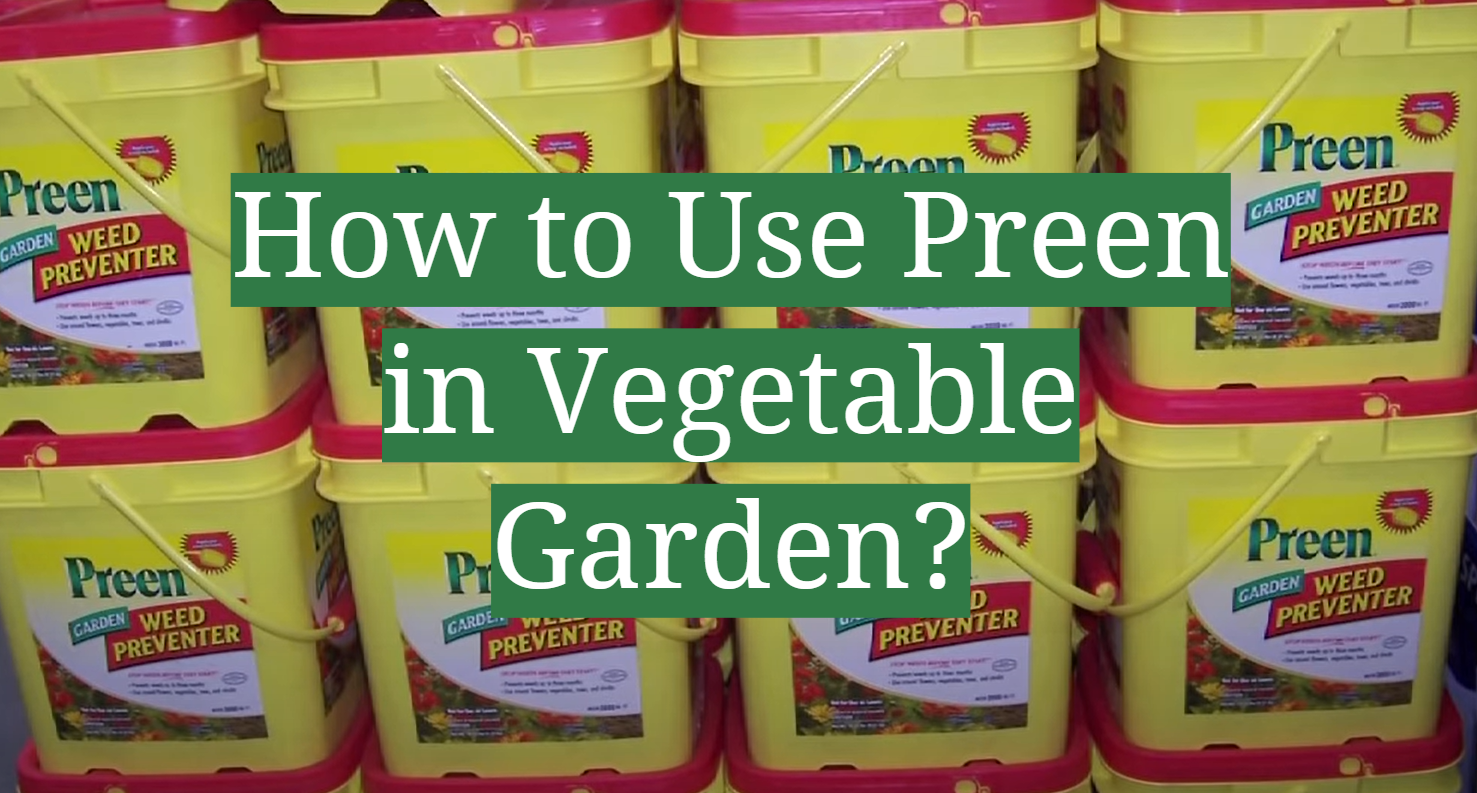
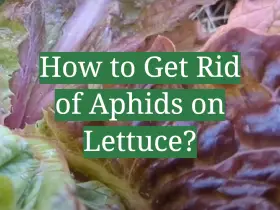
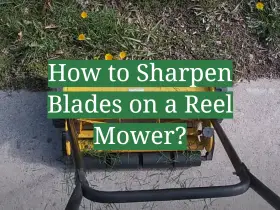
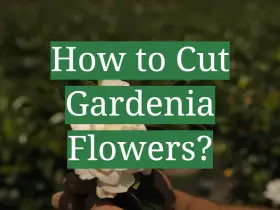
Preen is a pre emergent herbicide that can be used to control weeds in your garden. It works by preventing the weed seeds from germinating, so it is important to apply it before the weeds start to grow. I have found that preen works best when it is applied to moist soil, so you may need to water your garden before applying it. Make sure to read the instructions on the label carefully, as preen can be harmful to some plants.
Preen is a fertilizer that is spread on the ground to help keep plants healthy and looking neat. I like to use preen in my vegetable garden because it helps keep the weeds at bay and makes my plants look nicer. I have found that preen works best when I apply it to the soil before I plant my vegetables. This helps the preen to work its way down into the soil and get to the roots of the plants. I usually apply it once a month, and I have found that my plants are healthier and look better than when I don’t use preen.
I love to garden, and I’m always looking for ways to make my garden even better. So I was interested when I read that I could use Preen in my vegetable garden. I wasn’t sure how it would work, but I was willing to give it a try.
I followed the instructions on the bottle, and it was really easy to use. I just sprinkled it around the edges of my vegetable garden, and then watered it in. It took a little while for the Preen to start working, but after a few weeks I could definitely see a difference. My vegetables were growing bigger and healthier, and there was less of a chance of them being attacked by pests.
I’m really happy with how Preen worked in my vegetable garden, and I’ll definitely be using it again next year. If you’re looking for an easy way to improve your vegetable garden, I recommend giving Preen a try!
I remember the first time I ever used preen in my garden. I had no idea what it was for or how it worked, but I was determined to make my vegetables as healthy and lush as possible. After a little bit of research, I learned that preen is actually a type of pesticide that is used to kill bugs and pests. It’s also used to help plants grow more quickly and resist disease.
I was a little hesitant to use it at first, but I decided to give it a try. And I’m glad I did! My vegetables looked so much healthier after using preen, and they were less likely to get attacked by bugs and pests. If you’re looking for a way to make your vegetable garden thrive, preen is definitely the way to go!
I have never used preen in my vegetable garden before, so I can’t say for certain if it works or not. However, I have heard from many people that it does help to keep the weeds at bay, so I would recommend giving it a try. Make sure to read the instructions on the bottle carefully, and be sure to follow them exactly.
Preen weed killer is a popular choice for weed control in vegetable gardens. It is easy to use, and it can be applied either as a granular or liquid form. Preen works by preventing weed seeds from germinating, so it should be applied before weeds start to grow.
I find that the best time to apply Preen is just after I have planted my vegetables. I spread a thin layer of Preen over the soil and then water it in. This will help to keep the weeds at bay and will also help to protect the young plants from being smothered by the weeds.
Preen is a pre emergent herbicide that can be used in vegetable gardens to help control weeds. It works by inhibiting the germination of weed seeds, and it is most effective when applied before the weeds germinate. Preen is available as a granular or liquid form, and it can be applied using a spreader or watering can.
I have been using preen in my vegetable garden for the past few years, and I have found that it does a great job of controlling weeds. I like to apply it shortly before I plant my vegetables, and then again about a month later. I have found that this helps keep the weeds under control, and it makes it much easier to keep my garden looking neat and tidy.
I have been using preen in my vegetable garden for a few years now and I have never had any problems. I make sure to follow the directions on the bottle and apply it to the plants when they are young and before they start flowering. I have never had any issues with pests or diseases, and my vegetables always look great!
One of the best ways to ensure your vegetable garden looks great all season long is to use Preen. This product helps to control weeds, and it’s easy to apply. I typically apply Preen twice a year, once in the early spring and again in the late summer.
I always make sure to read the directions on the Preen container carefully, so that I know how much to use and how to apply it. In general, I just sprinkle it around the base of my plants, making sure to get it on the weed leaves as well.
Preen works best when used in combination with other gardening methods, such as mulching and watering regularly. By using Preen in my garden, I’ve been able to reduce the amount of time I spend weeding, and I’ve also seen an improvement in the overall health of my plants.
I remember the first time I used Preen in my vegetable garden. I was a little hesitant at first, but after seeing how well it worked, I was sold! Not only does Preen help to keep the weeds at bay, but it also helps to nourish the soil. This makes for healthier plants and a bountiful harvest. I highly recommend using Preen in your vegetable garden – it’s a great way to keep your plants healthy and weed-free!
I was so excited to use preen in my garden this year! I had read that it was a great way to keep the weeds down and the vegetables healthy. I followed the directions on the bottle and applied it to my garden. Unfortunately, it didn’t work as well as I had hoped. The weeds kept growing and the vegetables weren’t as healthy as they were before. I would not recommend using preen in your garden if you are having trouble with weeds.
I’ve never been very good at keeping up with the garden. Every year, I promise myself that I’ll be more diligent in keeping it weed-free, but by the time summer rolls around, the weeds have taken over. This year, I’m determined to get ahead of the game, so I’ve been doing some research on weed preventers.
One product that keeps coming up is Preen. It’s a pre-emergent herbicide that prevents weed seeds from germinating. According to the label, it’s safe for use in vegetable gardens. I decided to give it a try and so far, it seems to be working well. The only downside is that it’s a little expensive, but it’s worth it to me to not have to spend hours every week weeding my garden.
I have been gardening for a while now, and I have tried many different ways to keep my plants healthy and looking good. One of the products I have found to be very helpful is preen. Preen is a weed preventer that helps to keep the dirt around your plants free of unwanted plants. It is important to use preen in your vegetable garden, because it can help to protect your plants from harmful weeds.
I have found that using preen in conjunction with other gardening practices, such as watering and fertilizing, helps to give my plants the best chance for success. I like to use preen about a week before I plant my vegetables, and then again about two weeks after they have been planted. This helps to keep the weeds at bay and allows my plants to grow big and strong.
I applied preen to my vegetable garden a few weeks ago and so far, the results have been great! The plants seem to be doing really well and they’re looking a lot healthier than they did before. I’m definitely going to keep using preen in the future because it’s been working so well for me.
Preen is a weedkiller and soil conditioner. It is a granular product that is broadcast over the soil and then watered in. You can use it in your vegetable garden to control weeds and improve the soil.
I always water my garden after I apply preen. This helps to distribute the product evenly and ensures that the plants get the nutrients they need. I have found that using preen makes my garden much healthier and helps to keep the weeds under control.
I don’t know about you, but I am always a little leery of using weed killers in my garden. I mean, I want to get rid of the pesky weeds, but I don’t want to harm my plants in the process. So when I heard about Preen, I was excited to try it.
Preen is a weed killer made from ingredients like corn gluten and clove oil. It is organic and biodegradable, so I feel safe using it in my garden. And it really works! Within just a few days of using Preen, I could see the weeds starting to die off.
I highly recommend Preen to anyone looking for an effective and safe weed killer.
I have used preen weed killer to great success in my vegetable garden. I mix it with water and apply it to the plants that I want to protect. It is very important to follow the directions on the bottle, as too much of the weed killer can be harmful to plants. I find that using preen weed killer helps keep my garden healthy and free of weeds.
I’m not sure if preen is safe for vegetable gardens, but I’ve been using it for years in my flower garden with no problems. I would recommend doing a little research online to be sure, but I think you’ll find that it’s safe to use. Preen helps keep the weeds down, and it also helps to keep the moisture in the soil. I can’t tell you how many times I’ve been able to save a wilting flower just by using preen!
I have been using a preen weed preventer in my vegetable garden for a few years now and I have to say that it works great! I used to have a lot of weeds in my garden, but since I started using preen, the weeds have virtually disappeared. Not only does preen help to prevent weeds, but it also helps to keep the soil healthy and fertile. I would definitely recommend using preen if you have a vegetable garden!
I always felt a little unsure of myself when I was around other gardeners. It wasn’t that I was worried about what they would think of me, but more so what they would think of my gardening skills. I would see them using all sorts of products – like Preen – to help keep their gardens looking perfect, while my garden always seemed to be a little less than perfect.
I eventually decided to ask one of the other gardeners what Preen was, and she told me that it was a product used to prevent weeds from growing. She also told me that it was important to use Preen around plants that you didn’t want to have weeds grow in, like vegetables.
At first, I was hesitant to use Preen in my vegetable garden. I didn’t want to ruin the vegetables by using a product that wasn’t meant for them. But after seeing how well it worked in other people’s gardens, I decided to give it a try. And I’m glad I did!
Since using Preen in my vegetable garden, I’ve noticed a big difference in the amount of weeds that are growing. The vegetables are also looking much healthier, and I haven’t had any problems with them being ruined by the Preen.